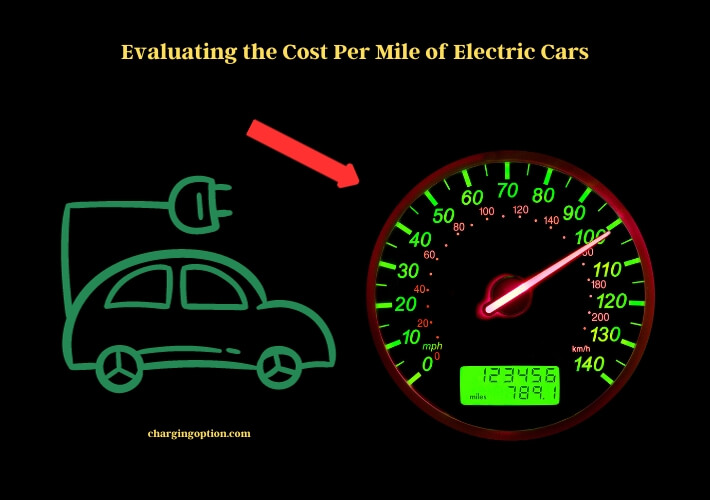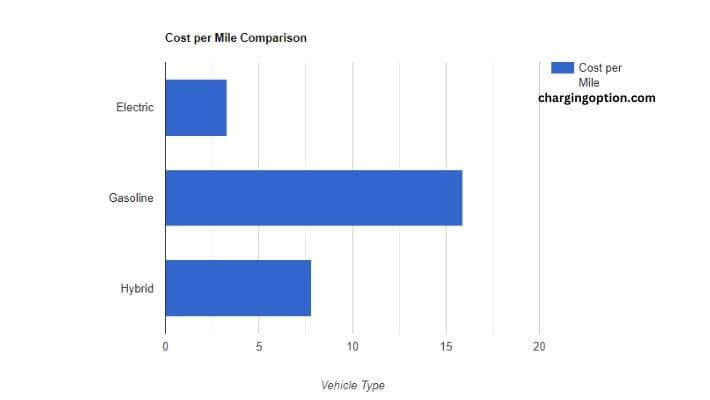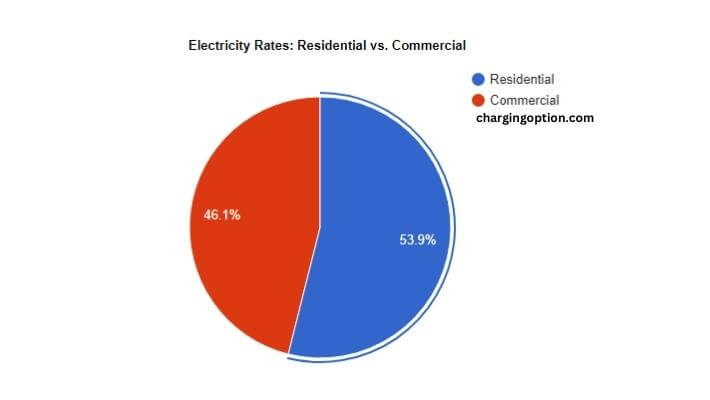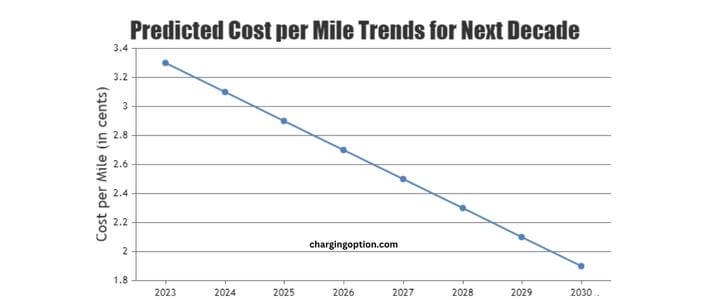The cost per mile of an electric car varies based on electricity rates and the vehicle’s energy efficiency. On average, an electric vehicle with an efficiency of 3 miles per kWh incurs an energy cost of about 3.3 cents per mile, given the U.S. average electricity cost of 10 cents per kWh.
Electric cars and gasoline-fueled vehicles have different energy costs associated with their operation. The cost to drive an electric car depends largely on the price of electricity per kilowatt-hour (kWh) and the car’s energy efficiency. In the U.S., the average cost of electricity hovers around 10 cents per kWh. Electric utility rates can fluctuate based on time, day, and season, sometimes ranging from 3 cents to 50 cents per kWh. Electric vehicles’ efficiencies also vary, with some older models achieving about 2 miles per kWh, while others, like the EV1 from General Motors, can achieve over 6 miles per kWh.
In contrast, gasoline vehicles have their energy costs determined by the price of gasoline and their miles per gallon efficiency. For instance, a gasoline car with an efficiency of 22 miles per gallon has an energy cost of approximately 15.9 cents per mile when gasoline is priced at $3.50 per gallon. Commercial fleet vehicles, like light-duty pickups, generally achieve between 17 to 22 miles per gallon.

Hybrid electric vehicles, which combine gasoline and electric power, are also gaining traction. A hybrid with an efficiency of 45 miles per gallon would have an energy cost of 7.8 cents per mile, assuming gasoline costs $3.50 per gallon.
Interested in more insights? Dive deeper into the detailed article below.
Basics of Electric Car Operation
How electric cars work
Electric cars, unlike their gasoline counterparts, rely on batteries to power an electric motor. This motor then propels the vehicle forward. The beauty of electric cars lies in their simplicity. With fewer moving parts than a traditional car, they often require less maintenance. Think of it like your household electronic devices. You charge them, use them, and then recharge them. Similarly, electric cars need to be plugged in, charged, and then they’re ready to hit the road.
The role of batteries and charging
The heart of every electric car is its battery. It’s the battery that stores the energy required to drive the electric motor. Charging an electric car is akin to charging your smartphone. You plug it in, wait for it to charge, and then you’re good to go. The duration of the charge depends on the battery size and the speed of the charging station. It’s fascinating how technology has allowed us to drive cars using the same principle as turning on a light bulb, isn’t it?
Factors Determining the Cost Per Mile for Electric Cars
Electricity rates and their variations
The cost of charging an electric car is directly tied to electricity rates. These rates can vary based on where you live and the time of day. For instance, in the U.S., the average cost of electricity is around 10 cents per kWh. But did you know that some places offer lower rates during off-peak hours? That’s right! Charging your car at night might save you some bucks.
Energy efficiency of different electric car models
Not all electric cars are created equal. Some can travel more miles than others on a single charge. This efficiency is measured in miles per kWh. For instance, an electric car with an efficiency of 3 miles per kWh would have an energy cost of about 3.3 cents per mile if electricity costs 10 cents per kWh. It’s like having cars with different fuel efficiencies. Some sip the energy, while others guzzle it.
External factors like location and time of charging
Where you charge your car and when can also influence the cost. Some areas have higher electricity rates, while others might offer incentives for electric car owners. Charging during peak hours might be pricier than during off-peak times. It’s always a good idea to be aware of these factors to optimize your charging strategy.
Comparison with Gasoline Vehicles
How gasoline cars calculate cost per mile
Gasoline cars have a more straightforward calculation. You take the cost of a gallon of gas and divide it by the car’s miles per gallon (mpg) efficiency. For instance, if gas costs $3.50 per gallon and your car has an efficiency of 22 mpg, your cost per mile would be around 15.9 cents. It’s a simple math that has been used for decades.
Variability in gasoline prices
Gasoline prices are notorious for their fluctuations. They can change based on global events, supply and demand, or even local taxes. This variability means that the cost per mile for gasoline cars can change from one day to the next. It’s a bit like playing the stock market, but with your car’s fuel efficiency.
| Vehicle Type | Cost per Mile (at current rates) |
| Electric | 3.3 cents |
| Gasoline | 15.9 cents |
Hybrid Vehicles: A Middle Ground
Introduction to hybrid vehicles
Hybrid vehicles are like the best of both worlds. They combine a gasoline engine with an electric motor. This combination allows them to achieve better fuel efficiency than traditional gasoline cars. When driving at low speeds or in traffic, the electric motor takes over, saving fuel. At higher speeds, the gasoline engine kicks in.
Cost per mile calculations for hybrids
Calculating the cost per mile for hybrids involves considering both the gasoline and electric components. If a hybrid gets 45 mpg and gasoline costs $3.50 per gallon, the cost per mile would be around 7.8 cents. It’s like having a two-in-one deal, where you get the benefits of both electric and gasoline powertrains.
Chart:

Electricity Costs Across the U.S.
Average national electricity rates
Electricity rates can vary widely across the U.S. On average, Americans pay about 10 cents per kWh. But this is just an average. Some states, due to their abundant natural resources or investments in renewable energy, might offer lower rates. Others, due to high demand or infrastructure challenges, might have higher rates.
Residential vs. commercial rates
Did you know that businesses often pay different electricity rates than households? That’s right! Commercial rates can sometimes be lower than residential rates. This difference is due to the bulk usage by businesses, which can lead to discounts. On average, residential rates hover around 11.7 cents per kWh.
Chart:

Historical Perspective on Electric Vehicle Charging Rates
How rates have changed over time
Electric vehicle charging rates haven’t always been consistent. Over the years, as technology advanced and more electric vehicles hit the roads, the rates have seen some fluctuations. In the past, these rates ranged from as low as 3 cents to a whopping 50 cents per kWh. It’s intriguing to see how market dynamics, technological advancements, and consumer demand have shaped these rates.
Peak and off-peak charging rates
Just like with regular electricity rates, EV charging rates can vary based on the time of day. Charging during peak hours, when everyone is using electricity, might be more expensive than charging during off-peak hours, like late at night. Some utilities even offer special EV charging rates to encourage off-peak charging. It’s a win-win, as it reduces strain on the grid and can save money for the consumer.
Tools for Accurate Cost Calculations
Importance of personalized calculations
Every driver’s situation is unique. The distance you drive daily, where you live, and when you charge your car can all influence your cost per mile. That’s why it’s crucial to make personalized calculations. General averages can give you a ballpark figure, but for precise numbers, you need to consider your specific scenario.
Factors to consider for individual scenarios
Several factors can influence your electric car’s cost per mile. The efficiency of your specific car model, local electricity rates, and even the wear and tear on your battery can play a role. It’s like piecing together a puzzle. Each piece, or factor, contributes to the bigger picture, which in this case, is your cost per mile.
Calculator:
Future Trends and Predictions
Advancements in battery technology
Battery technology is rapidly evolving. With each passing year, batteries become more efficient, last longer, and charge faster. This progress means that the cost per mile for electric cars is likely to decrease in the future. Imagine a world where charging your car takes only a few minutes and lasts for hundreds of miles. We’re not there yet, but with the pace of advancements, it might not be too far off.
Predicted shifts in electricity rates
As renewable energy sources like wind and solar become more prevalent, electricity rates might see some changes. The increasing adoption of these green energy sources can lead to more stable and potentially lower electricity rates. It’s a promising future for electric car owners, as both the environment and their wallets stand to benefit.
Chart:

So, there you have it! The cost per mile of electric cars isn’t just a simple number. It’s influenced by various factors, from electricity rates to car efficiency. While electric cars offer a promising future with their potential for lower costs and environmental benefits, it’s essential to stay informed. By understanding the factors at play and using tools like calculators, you can make the most of your electric car experience. And with the rapid advancements in technology, who knows what the future holds? One thing’s for sure, though – the journey is bound to be electrifying!
